
TABLE OF CONTENTS

Mission Statement
Letter From The Vice President For Research
Our Time is Now: University Rankings & Statistics
Developing ASPIRE
Committee Members And Support Team
Five Strategies For Achieving Our Vision
Strategy 1: Our People
Strategy 2: Partnerships and Innovation
Strategy 3: Supporting Infrastructure
Strategy 4: Focus on Scholarship and Excellence
Strategy 5: Impact Areas
Impact Area 5.1: Healthy Florida
Impact Area 5.2: Advancing Materials
Impact Area 5.3: A Resilient Future
2
Themes 3 4 6 8 9 10 11 12 13 14 15 16 18 20 22
Crosscutting
Identify strategic areas of focus and investment to ensure FSU’s growing research enterprise has sustainable impact for our future
3
LETTER FROM THE VICE PRESIDENT FOR RESEARCH
Dear Colleagues,
Florida State University is one of the nation’s premier Research 1 institutions with a vibrant community of researchers, creators, and innovators and a long history of excellence in the sciences, arts, and humanities. President Richard McCullough and the FSU Board of Trustees have set aggressive goals and challenged our university community to build on this strong foundation to further develop and mature our research and creative operations.
To help guide our efforts, the FSU Office of Research launched ASPIRE –A Strategic Plan to Inspire Research Excellence.
With the help of an accomplished faculty committee, input from the Council of Associate Deans for Research, analyses of funding and publication trends, and a campuswide survey, we have crafted a robust and ambitious plan for FSU that identifies strategic areas of focus and investment. The vision and initiatives for executing these strategies are detailed throughout the ASPIRE plan.
FSU has very dedicated faculty, staff, and students who share a deep passion for this great institution and are committed to helping it rise to new heights. Thank you for your contributions and look forward to working with you in the coming years as we implement ASPIRE and build a better future together.
Stacey S. Patterson, Ph.D. Vice President for Research

4
5 STRATEGIES FOR ACHIEVING OUR VISION



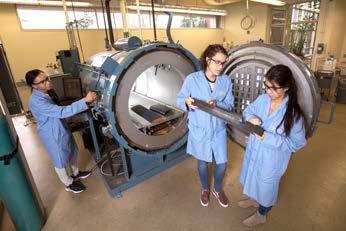

1 Our People
Growing and supporting high-quality and diverse faculty and staff is the key enabler for achieving our vision. Competition for top talent is fierce, and we must intensify our efforts to recruit and retain outstanding people and support their long-term career development.
2 Partnerships and Innovation
The development and nurturing of partnerships is required to fully realize our potential. Partnerships often bridge the gaps in knowledge and expertise and allow us to leverage strengths and resources that result in better solutions and more efficient translation to real-world application and impact.
3 Supporting Infrastructure
Fostering a robust research, innovation, and creative research enterprise focused on the development of new ideas and platforms is key to our success. We must reduce real and perceived barriers to conducting investigator-initiated research and team-based projects across the university.
4 Focus on Scholarship and Excellence
Committing to excellence is a vital ingredient of our success. FSU enjoys strong faculty and staff leadership in broad areas that have significance and relevance to our world and its people. We must celebrate our achievements and tell our stories.
5 Impact Areas and Crosscutting Themes
FSU will invest strategically in areas that build on existing strengths to accelerate our impact. Three overarching collaborative research impact areas and two crosscutting themes emerged to which the ASPIRE committee developed and identified relevant subcategories.
5
OUR TIME IS NOW
As one of the nation’s elite research universities, Florida State University preserves, expands, and disseminates knowledge in the sciences, technology, arts, humanities, and professions, while embracing a philosophy of learning strongly rooted in the traditions of the liberal arts and critical thinking.
$2.62B Operating Budget
15,000+ Employees
1,905 Faculty
44,597 students
$ 414 +M
Total Research Expenditures


NATIONAL SCIENCE FOUNDATION
Highest Funding in Florida $75M in 2023
NATIONAL INSTITUTES OF HEALTH
Focus for targeted growth $45.5M in 2023
6
FLORIDA STATE UNIVERSITY
# 23
OVERALL RANKING
1st Standalone College of Entrepreneurship
928 Student and Graduate Startups
Among public universities in U.S. News & World Report Association of American University Awards Additional Honors
20 FSU GRADUATE PROGRAMS ARE NATIONALLY RANKED IN THE TOP 25
A BEST VALUE IN FLORIDA
Ranked # 21 in the nation by Princeton Review, 2023
203
144
476
Top American Research University Awards
7
DEVELOPING ASPIRE

To meet FSU’s ambitious aspirations in research, scholarship, and creative activities, we must grow judiciously and develop a supportive infrastructure. The overall goal of ASPIRE is to help identify strategic areas of focus and investment to ensure FSU’s growing research enterprise has sustainable impact for the future.
The faculty-driven process of developing ASPIRE and the strategies identified herein help us better understand where we need to focus our efforts, and the impact areas and crosscutting themes suggest high probability areas of growth and connectivity for maximal impact.
ASPIRE Faculty Committee
Council of Associate Deans for Research Report
ASPIRE Faculty Survey & Website Feedback
Funding & Publication Analyses
FSU Strategic Plan
Preliminary Results Assessed DRAFT PLAN CREATED
Open Forums to Share Draft and Obtain Feedback

RESEARCH STRATEGIC PLAN
ESTABLISHED
8
COMMITTEE MEMBERS AND SUPPORT TEAM
FACULTY STEERING COMMITTEE
• Ali Bangura, National High Magnetic Field Laboratory
• Brian Barton, the Graduate School
• Neelam Bharti, University Libraries
• Bridgett Birmingham, Faculty Senate President/University Libraries
• Patricia Born, College of Business
• Jennifer Copp, College of Criminology
• Sarah Eyerly, College of Music
• Debi Fadool, College of Arts and Sciences
• Heather Flynn, College of Medicine
• Jonathan Fozard, Information Technology Services
• Carolina Gonzalez, College of Arts and Sciences
• Matt Hauer, College of Social Sciences and Public Policy
• Roxanne Hughes, National High Magnetic Field Laboratory
• Katie Kehoe, College of Fine Arts
• Richard Liang, FAMU-FSU College of Engineering
• Nathan Line, College of Hospitality
• Jake Linford, College of Law
• Marcia Mardis, College of Communications and Information
• Meredith McQuerry, Jim Moran College of Entrepreneurship
• Josh Newman, College of Education and Health and Human Sciences
• Yaacov Petscher, College of Social Work
• Harrison Prosper, College of Arts and Sciences
• Gary Tyson, College of Arts and Sciences
• Frankie Wong, College of Nursing
ASPIRE SUPPORT AND FACILITATION
• Hal Beardall, Director, FCRC Consensus Center
• Joe Frascella, Chief Clinical Officer
• Rachel Goff-Albritton, Assistant Director, Research Development
• Kathleen Haughney, Assistant Director, Research Communications
• William Hill, Director and Attending Veterinarian, Laboratory Animal Resources
• Beth Hodges, Director, Research Development
• Eric Holmes, Assistant Vice President for Research
• Rafael Montalvo, Associate Director, FCRC Consensus Center
• Kerry Peluso, Associate Vice President for Research
• Nicole Viverito, Coordinator, Health Science, Research Development

9
5 PARTNERSHIPS AND INNOVATION
• Establish and communicate FSU’s bold vision.
• Develop simple commercialization and partnership engagement processes.
• Increase opportunities to work together to develop impactful solutions.
• Encourage cross-disciplinary engagement for students and faculty.
FOCUS ON SCHOLARSHIP AND EXCELLENCE
• Communicate excellence.
• Celebrate success.
• Recognize the contributions of all disciplines at all levels.
• Align efforts to ASPIRE.
5 STRATEGIES FOR ACHIEVING OUR VISION 1 3 5
2 4
• Retain and recruit high-quality faculty and staff.
• Increase research support.
• Support broad perspectives and inputs.
• Establish incentives that encourage creativity and innovation.
• Invest in research assistants and post-docs.
OUR PEOPLE SUPPORTING INFRASTRUCTURE
• Improve and expand facilities.
• Streamline and enhance administrative support systems.
• Enhance training programs.
• Increase and maintain shared resources.
IMPACT AREAS AND CROSSCUTTING THEMES
• Impact Area 1: Healthy Florida
• Impact Area 2: Advancing Materials
• Impact Area 3: A Resilient Future
• Crosscut 1: The Future of Intelligence
• Crosscut 2: The Human Experience
10

STRATEGY 1
OUR PEOPLE
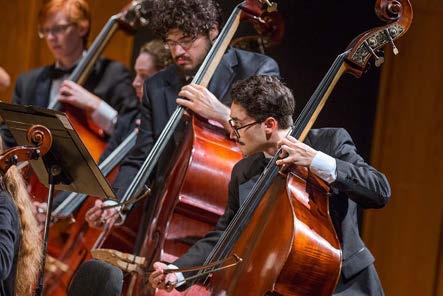
Growing and supporting high-quality and diverse faculty and staff is the key enabler for achieving our vision. Competition for top talent is fierce, and we must intensify our efforts to recruit and retain outstanding people and support their long-term career development.
1.1 Retain and recruit high-quality faculty and staff.
• Ensure start-up packages and compensation are competitive with peer institutions and programs
• Plan for teaching loads to be competitive with peer institutions
• Boost ongoing professional development opportunities and protections for faculty and staff
1.2 Increase research support.
• Grow the number of high-quality departmental grants management staff
• Develop grants support plans for underserved colleges/units
• Enhance assistance with grants development and management
1.3 Support broad perspectives and inputs.
• Preserve the academic freedom of faculty research and scholarship
• Foster a culture of respect and inclusion that leads to a sense of belonging for all members of the campus community
• Train and mentor our research community to encourage varying perspectives that lead to better outcomes
1.4 Establish incentives that encourage creativity and innovation.
• Develop a reward and recognition system that promotes the participation in creative and innovative endeavors
• Communicate paths for promotion and opportunities for professional growth
1.5 Invest in research assistants and post-docs.
• Streamline and increase hiring flexibility where possible
• Encourage and recognize mentoring efforts
15,000 + EMPLOYEES
11

STRATEGY 2
PARTNERSHIPS AND INNOVATION
The development and nurturing of partnerships is required to fully realize our potential. Partnerships often bridge the gaps in knowledge and expertise and allow us to leverage strengths and resources that result in better solutions and more efficient translation to real-world application and impact.
2.1 Establish and communicate FSU’s bold vision.
• Define the value of partnerships, collaboration, and innovation to FSU
• Communicate the value of all types of research and its translation to the FSU community and our potential partners
• Convey information about existing resources and services aimed at facilitating partnerships and collaboration
2.2 Develop simple commercialization and partnership engagement processes.
• Reimagine FSU’s technology transfer and corporate partnership processes
• Centralize support for strategic partnerships
• Include faculty in the process and communicate plans, opportunities, and success broadly
2.3 Increase opportunities to work together to develop impactful solutions.
• Evaluate opportunities to provide additional protected time for collaborative initiatives
• Offer additional occasions for faculty to innovate ideas and develop fruitful partnerships
• Focus efforts on FSU strengths that bring broad groups to the table
2.4 Encourage cross-disciplinary engagement for students and faculty.
• Remove the barriers for students and faculty to engage in partnerships
• Promote dual degree programs
• Encourage joint appointments across disciplines
12

STRATEGY 3
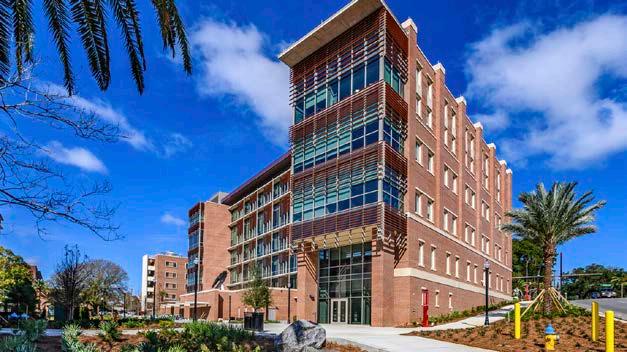
SUPPORTING INFRASTRUCTURE
Fostering a robust research, innovation, and creative research enterprise focused on the development of new ideas and platforms is key to our success. We must reduce real and perceived barriers to conducting investigator-initiated research and team-based projects across the university.
3.1 Improve and expand facilities.
• Identify and prioritize buildings and facilities that need improvements or maintenance to support cutting-edge innovation and creativity
• Develop multi-purpose, shared, and collaborative spaces
• Ensure access to parking at all times
3.2 Streamline and enhance administrative support systems.
• Identify opportunities for simplifying processes in systems
• Find ways to reduce administrative burden
• Invest in facilitators to support administrative processes
3.3 Enhance training programs.
• Create enhanced training for faculty, staff, and students new to research and the funding processes
• Ensure training is available as needed
• Enhance continuous training opportunities for faculty and staff
3.4 Increase and maintain shared resources.
• Increase availability of IT support and computing capacity
• Develop and disseminate inventories of available equipment, materials, software, and data
• Monitor the lifecycle of existing assets and establish policies for timely replacement of outdated resources and equipment
13

STRATEGY 4

FOCUS ON SCHOLARSHIP AND EXCELLENCE
Committing to excellence is a vital ingredient of our success. FSU enjoys strong faculty and staff leadership in broad areas that have significance and relevance to our world and its people. We must celebrate our achievements and tell our stories.
4.1 Communicate excellence.
• Increase the visibility of faculty research, grants, and awards
• Boost our investment in research, innovation and creative excellence programs and recognition
• Amplify faculty work and FSU impact beyond the FSU website (e.g., national press, conferences)
4.2 Celebrate success.
• Develop new ways to recognize faculty scholarship and excellence
• Leverage existing leadership and service in national organizations
• Create awards or celebrations of faculty and staff for their support of research (e.g., service, mentorship, community engagement, partnership development)
4.3 Recognize the contributions of all disciplines at all levels.
• Invest in early career faculty and the communication of their work
• Highlight how all disciplines contribute to the FSU research, creativity, and innovation enterprise
• Develop ways for more people to engage in creative and innovative endeavors
4.4 Align efforts to ASPIRE.
• Communicate the ASPIRE plan broadly
• Incentivize work within colleges that tie directly to ASPIRE
14

STRATEGY 5

IMPACT AREAS AND CROSSCUTTING THEMES




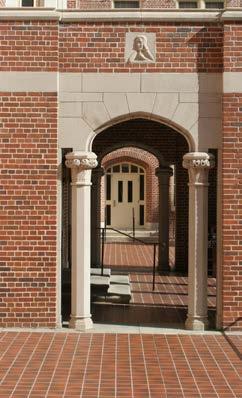
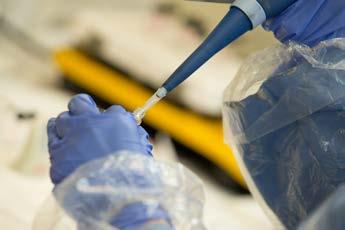
ASPIRE builds on existing capacity at FSU while also considering promising new opportunities for our future. Based on information obtained from a campuswide survey, funding and publication trend analyses, and alignment with state and national priorities, three overarching collaborative research impact areas emerged. These include: 1. Healthy Florida, 2. Advancing Materials, and 3. A Resilient Future. Additionally, the Future of Intelligence and the Human Experience were identified as two important crosscutting themes that have deeply rooted influence across each impact area. These areas will collectively serve as our guideposts as we continue to build FSU’s research and creativity enterprise.
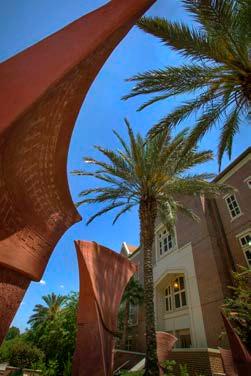

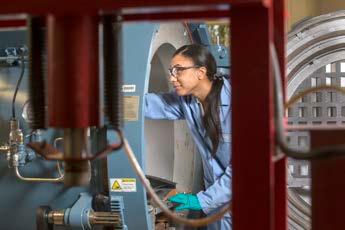



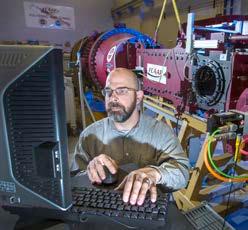
The ASPIRE committee collaboratively advanced relevant subcategories to help focus each impact area and provided additional context and connections for the crosscutting themes. These focus areas will help further guide our priorities for strategic investment and growth; we will consider these areas when identifying priorities for FSU colloquia, pilot/seed projects, joint research efforts, shared services, and faculty recruitments. FSU will continue to evaluate each area over the coming years as we grow and our opportunities evolve.

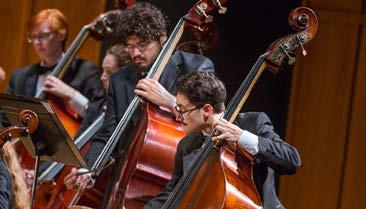



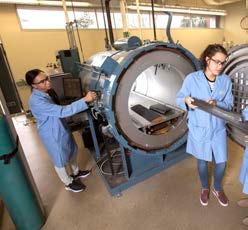


15


FSU IMPACT AREA 5.1
HEALTHY FLORIDA
Successful Aging
Successful aging focuses on improving the health span for all individuals. From healthcare and psychology to biomedicine and neurocognitive sciences, technology and the social sciences, the research opportunities are broad. Specific areas include: healthy aging and longevity through the investigation of biological, genetic, and lifestyle factors that contribute to healthy aging; cognitive health interventions to maintain or improve cognitive function in older adults or delay cognitive decline; technology to assist older adults in maintaining independence and improving quality of life; psychosocial well-being examinations of the impact of social connections, community engagement and mental health; physical fitness and mobility tests of exercise regimens, physical therapies, and assistive technologies; aging and chronic diseases like cardiovascular diseases, diabetes, and neurodegenerative disorders; cultural and societal perspectives toward aging that influence the experience of aging; and elderly care policy research on healthcare systems, policies, and programs designed for older adults.
Mental and Behavioral Health
Mental and behavioral health research represents a high-opportunity area given such important factors as community needs, the shortage of behavioral health treatment services (particularly in underserved populations), overlaps and co-occurrence between mental illness and other diseases/disorders, pain treatment and the opioid crisis, the intersection of legal, illegal, and medical uses of cannabis products, and the importance of drug and alcohol as basic probes for CNS research. FSU has an opportunity to grow research programs in areas that focus on: co-occurring substance use disorders and mental illness; developmental effects and early influences such as prenatal exposure, child/adolescent exposure, vulnerable periods, and neurobehavioral effects; mental health/substance abuse interventions such as pharmacotherapy, non-invasive neuromodulation, and behavioral therapy development; commonalities between obesity and addiction; pain and analgesia; technology-based interventions; prevention and early intervention; epidemiology and population-based studies; reduction in health disparities, experiences of stigma, and discrimination; cultural and social determinants; HIV/AIDS and substance use; genetics and epigenetics; and underage and collegeage drinking, substance use, and co-occurring mental illness.
16


HEALTHY FLORIDA
Health Technologies
Innovation in health technology will be critical to the success of FSU Health to aid in the delivery of quality healthcare to all, especially the underserved, rural, and hard-to-reach populations. Opportunities for research include: telemedicine for remote consultation and virtual appointments, and realtime data and remote monitoring of patients using wearables and sensors like smartwatches, fitness trackers, and biosensors; artificial intelligence and machine learning applications for diagnostics, drug discovery, personalized medicine, and predictive analytics to help identify patterns, assist in diagnosis, and suggest treatment plans; biomedical imaging with the National High Magnetic Field Laboratory, and the FSU Biology and Chemistry departments’ development of imaging agents; precision medicine based on individual variability in genes, environment, and lifestyle; robotics and automation for surgery, rehabilitation, and caregiving; healthcare data interoperability; 3D printing for prosthetics, implants, and tissue/organ bioprinting; virtual and augmented reality; and blockchain for improved data security, integrity, and privacy.
Human Performance & Well-Being
FSU houses expertise in human performance across the entire lifespan and range of physical and cognitive function, with a common focus on optimizing performance of the body’s systems. Advancements in these interdisciplinary areas can lead to improvements in individual and organizational/team performance in sports, healthcare, education, and workplace productivity. Specific opportunities for research include: bone health and fracture risk and repair; joint health, inflammatory diseases of joints, bones, and muscles; motor development and the nervous system; neuromuscular interaction; kinesiology and exercise physiology; movement disorders; physical therapy and rehabilitation/recovery; obesity and weight management; bioengineering of medical devices, implants, and robotic prosthetics; novel pain management and musculoskeletal approaches to treatment; athletic training and performance enhancement; cognitive enhancement and brain performance; human factors and ergonomics; military and defense performance; performance in extreme environments; skill acquisition and expertise development; human-computer interaction to optimize performance; age-related differences in cognitive and physical development and function; and real-time feedback and performance monitoring.
17

FSU IMPACT AREA 5.2
ADVANCING MATERIALS
Superconductivity
FSU is the host institution to the National High Magnetic Field Laboratory (MagLab), the Applied Superconductivity Center, and the Center for Advanced Power Systems (CAPS). These highly impactful research centers position the university as a key player in the research and development of superconductors and superconducting technologies. Advancing fundamental research and innovation in superconductors will also help strengthen other vibrant programs and provide opportunities for research in condensed matter physics, solid state chemistry, and materials science and engineering, with a strong impact on cutting-edge research areas such as topological and quantum materials, composite manufacturing, cryogenics, and AI-driven materials discovery.
Quantum Science and Engineering
Quantum science and engineering technology promises a deeper understanding of our universe, ultra-precise measurements, and new advanced materials and materials properties. With the initial $20 million investment into the FSU Quantum Initiative and the construction of the Interdisciplinary Research and Commercialization Building, the university has enhanced its opportunity to quickly emerge as a national leader in quantum information science and engineering (QISE). The QISE initiative builds on the work of more than twenty FSU faculty already securing several million dollars in external funding for QISE research. Significant, new federal and venture capital investments in this area provide additional vast opportunities for FSU to secure large-scale projects and increase its impact in QISE. The MagLab should be leveraged to continue building our leadership position on a national and international QISE stage, with specific research opportunities in quantum devices and quantum theory.
The National High Magnetic Field Laboratory is the only national lab in the state of Florida.
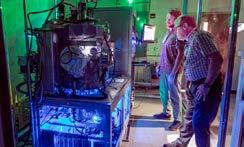
18

ADVANCING MATERIALS
Polymer Composites and Manufacturing
Polymer science provides critical elements for many current and emerging technologies, from optical components to wearable electronics and biomedical devices. Advances in synthesis, engineering, and theory are bringing next generation polymeric materials closer to the biomacromolecules that encode our genetics and provide the natural world with adaptive, protective, self-healing, and selfreplicating materials. FSU has built a strong core of polymer researchers within the FAMU-FSU College of Engineering and the College of Arts & Sciences, positioning the university to make a national-level impact in this area. Research into polymers stimulates new cross-disciplinary ideas and opportunities for research applications including sensors, composite materials, clean energy and beyond.
Drug Discovery and Delivery
FSU’s notable drug development history includes the successful anti-cancer drug Taxol that was developed in Dr. Robert Holton’s lab. FSU faculty continue to develop other drug candidates, taking them through early-stage clinical trials; several have been licensed to pharmaceutical companies for further development and testing. FSU has multiple research groups in Chemistry, Biology, Medicine, and Engineering focused on drug discovery and delivery. These efforts create a critical mass for significant opportunities to grow a larger multidisciplinary drug discovery and development enterprise. Opportunities for research include compounds that can be used widely across drug categories, and the development of small and large molecule therapeutics for a variety of indications such as: fibrosis; ADHD; corneal diseases; antivirals; and cancer.

19


Climate Variability and Extreme Weather
FSU faculty are working to improve our understanding of climate variability and extreme weather by fostering interdisciplinary research, developing new technologies, and strengthening education in climate science in Florida and beyond. Building on our existing strengths, FSU has the opportunity to grow our prominence in extreme weather events and climate variability; direct and indirect impacts of climate disasters, rising temperatures, and environmental conditions on the carbon cycle; plant and animal ecosystems; human health; critical infrastructure; the interplay between earth, sea, and air to predict future climate patterns; hurricane studies; flash floods; tropical convection; climate impacts on marine and coastal ecosystems; coastal restoration efforts; and preparing for and responding to climate disasters.
FSU IMPACT AREA 5.3 A RESILIENT FUTURE 250
FACULTY ENGAGED IN RESILIENCE AND SUSTAINABILITY RESEARCH
Trauma and Violence Prevention and Response
FSU is committed to creating a future that is resilient in the face of trauma and violence by strengthening the ability of individuals, families, communities, and the workforce to prevent and respond effectively. FSU has a strong foundation and should develop additional expertise in areas including: neuroscience and behavioral approaches to post-traumatic stress disorder; traumatic brain injury treatment; stress, trauma, and substance use; crisis interventions, trauma treatment, social support, and stress reduction programs for underserved populations, marginalized groups, and youth; trauma programs for incarcerated populations; gene-environment interactions; traumainformed housing design; poetry, art, and music therapy; violence causes and effects; firearm injury and mortality prevention; systemic interventions for traumatic event exposure; partner/family violence; intergenerational cycles of violence in infancy and early childhood; workplace violence for frontline workers; professional continuing education with a focus on resilience; and trauma awareness and resilience certifications.
20
+

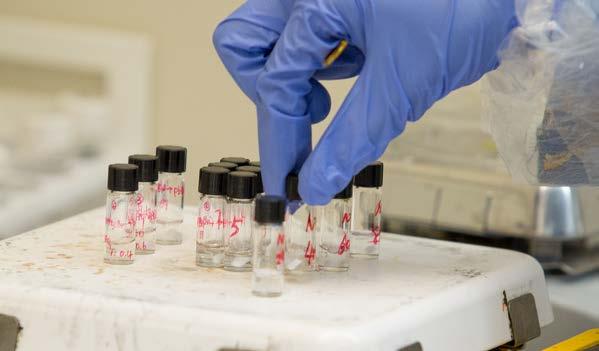
A RESILIENT FUTURE
Disaster Recovery and Economic Impacts
FSU has deep expertise in disaster recovery, resilience, and the economic impacts of disasters. FSU faculty are committed to supporting their home state of Florida, which is uniquely susceptible to natural disasters such as hurricanes due to its lengthy coastline and much of its land at or near sea level. Improving our ability to respond to and recover from disasters is one of the most pressing issues of our time, spanning from financial losses and environmental destruction to the direct impacts on people’s physical, mental, and even cultural wellbeing. Research opportunities include: disasterproof or resistant buildings and structures; coastal hazards; transportation issues; post-disaster material recycling and reuse; post-disaster field hospitals locations; modular solar systems to shorten outages and keep electricity flowing during and post-disaster; therapeutic arts programming designed to aid in survivors’ recovery; community disaster resilience: community variance in post-disaster resilience and recovery; and the impact of natural disasters on insurance trends.
Sustainable Solutions
FSU is a leader in sustainability research, with over 250 FSU faculty from nearly every college engaged in sustainability investigations across the campus. In 2019, FSU was identified as a top performer in the field of sustainability, ranking #1 in the research category of the Association for the Advancement of Sustainability in Higher Education Sustainable Campus Index. FSU is also home to the Sustainability and Governance Lab, an interdisciplinary research hub that investigates the planning, adoption, implementation, and effectiveness of policies and programs that promote sustainable development. Broad work in sustainability is currently active at: Center for Advanced Power Systems; Center for Economic Forecasting and Analysis; the Center for Environmental, Energy, and Land Use Law; Center for Ocean-Atmospheric Prediction Studies; Coastal and Marine Laboratory; the Florida Climate Institute; Florida Resources and Environmental Analysis Center; and the Resilient Infrastructure & Disaster Response Center.
Florida State University offers professional certifications in trauma and resilience for individuals and organizations.
21


CROSSCUTTING THEMES
The future of intelligence
Data are being generated at an unprecedented rate. Harnessing these data and developing our data science capacity in emerging fields such as artificial intelligence and machine learning is essential to advancing basic, translational, and clinical research efforts across the university. All disciplines are becoming more data-dependent, and our ability to link, cross-reference, and use data from disparate fields and sources will determine our ability to innovate, improve, and excel. As we develop our strategic Impact Areas, we will emphasize data use and methods and examine how it impacts our efforts and results. For example, basic science researchers may collaborate with experts able to develop and train machine learning systems to sift through large datasets to find patterns, speeding up their analysis and impact. Once considered disruptive, how we use data is now the currency of our present, and our future, and will be a key component of ASPIRE.
5,300
INDIVIDUALS CURRENTLY SERVED BY THE CENTER FOR AUTISM AND RELATED DISABILITIES
The human experience
As an R1 University, FSU has a responsibility to expand and communicate knowledge and positively influence society. We must always consider the people we serve as exemplified in our long tradition of community-engaged research in the College of Medicine, the College of Social Work, the Florida Center for Reading Research, and beyond. Our rich history in the arts and humanities permeates the university’s research and creative enterprise and shapes our future. It is the expertise of the faculty in these areas that help enrich our lives, open new avenues of inquiry, and enhance our research impact. Different ways of knowing, sharing, and meaningmaking are developed when we consider human impact, our communities, our creative endeavors, and our past.
As we develop our strategic Impact Areas, we will emphasize and find opportunities to explore and highlight the human experience. For example, researchers examining health issues may want to consider the limitations of underserved populations, and teams developing new technologies, particularly ones involving AI or machine learning, have a responsibility to consider how they affect creativity, individual privacy, and independent thought. Other groups may consider partnering with those who understand our past as we look to our future.
FSU faculty are creative thinkers with passion and drive to heighten the human experience through their work. That is a quality that makes FSU special and is a key component of ASPIRE.
22

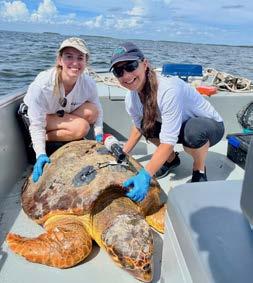





23



OFFICE OF RESEARCH
Florida State University research.fsu.edu
aspire@fsu.edu
850-644-9694



































































